After Paying 50
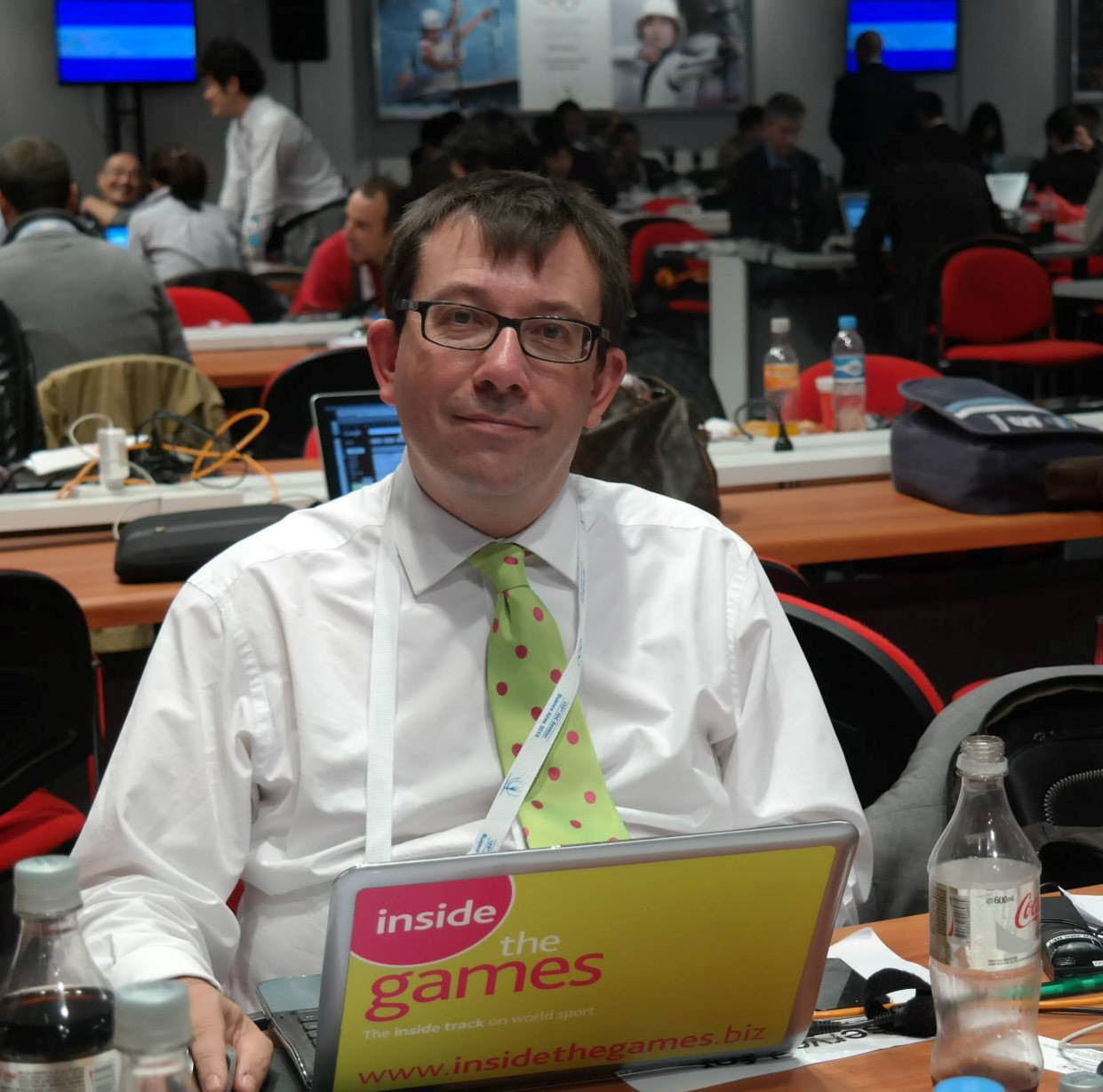
On Baronial 20 in 1968, tanks from the Soviet Union rolled into Czechoslovakia and the country woke upwards to horror and nightmare.
The Soviet Union were joined by three Warsaw Pact countries - Poland, Bulgaria and Republic of hungary - in an attack led by 250,000 combined troops, a number later increased to well-nigh 500,000, supported by thousands of tanks and hundreds of aircraft.
Information technology was code-named "Operation Danube" and was designed to crush the Prague Spring, a reform era started under new Czechoslovakian leader Alexander Dubcek, who shook up the political establishment by implementing freedom of the press, freedom of voice communication and liberty of travel, along with economical reforms. These liberalisation efforts, which he called "socialism with a homo face up," won popular back up from his citizens.
Even as the Soviet tanks rumbled through the Czech capital, backing for Dubcek's reforms came from all levels of society, including the most famous Czech of the time. Emil Zatopek, who at Helsinki in 1952 had become the get-go runner in history to win the 5,000 metres, 10,000m and marathon at the same Olympics, had been among those that had stood on the front line with his wife Dana to prove their support for the fight for greater freedom and improved living standards.
Emil and Dana, herself an Olympic gold medallist, signed the "2 Thousands Words," a statement of disobedience, of unity against the colossus to the East, signed by many prominent people. As Moscow re-asserted its iron grip on Czechoslovakia and drew it dorsum into its orbit, at that place was no problem finding the dissidents. Their names were on the manifesto.
In 1996, I was fortunate enough to sit down with Zatopek for more two hours at the International Association of Athletics Federations World Marathon Cup in Athens where the great and good had been invited to celebrate the centenary of the first Olympic marathon. It was the virtually interesting interview of my career.
"I went to Wenceslaus Square to talk to the Russians," Zatopek told me over a drinking glass of red wine as he recalled those events in 1968. "They did not desire to listen, but the people kept saying: 'Hear him out. Exercise you know your Olympic champions? He is our Olympic champion.' Finally, an officer came over. I told him that this invasion was one-sided, that it was offensive to all of usa, that it only hurt the Communist move."
The Soviets did not listen and retribution confronting the dissidents was swift and cruel. Doctors became window cleaners. Scientists became truck drivers. Legends became navvies. No one could complain. No one could talk. "The Russians came like barbarians," Zatopek said. "They had their tanks, their cannons. Nosotros are non guilty of anything, merely what are we going to practice? We cannot accuse tanks. It was like the end. No hazard."
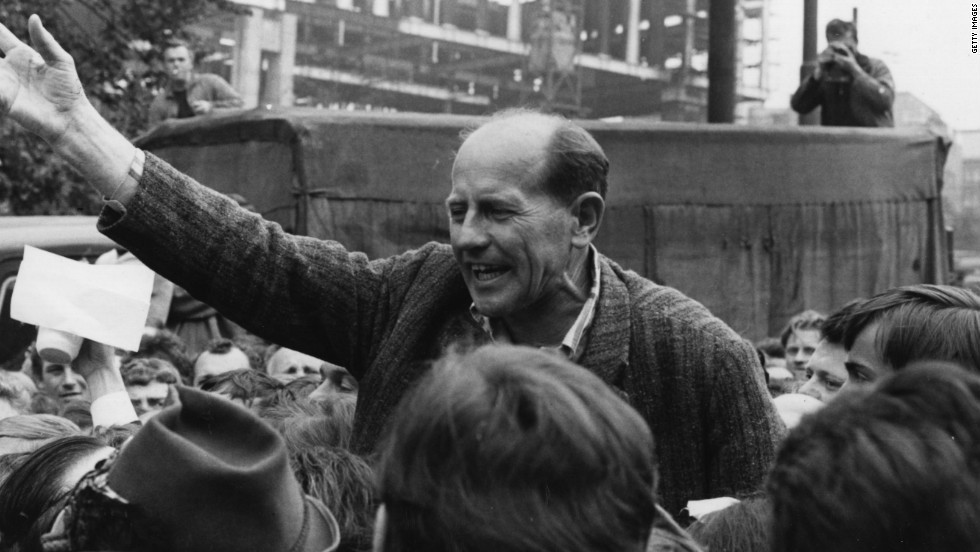
Zatopek was dropped from the ground forces and expelled from the Communist Party. He could not find piece of work in Prague. "I kept looking and looking, but no one would hire me," he said. "I could not empathize. Finally, a man told me that everyone in Prague was afraid to rent me. He said I would accept to find work exterior the metropolis."
The greatest distance runner of all fourth dimension became a member of a geological survey squad, which searched for minerals in the dorsum lands of the state. The chore was digging, doing construction. He dug. He lifted sacks of cement. He left home and lived in a trailer for stretches of 10 and 14 days. The work began at seven in the morning and ended at eight at night. When he came home for a fortnight, he was exhausted. It left him with the legacy of an irregular heartbeat. "It was working down the uranium mines," he said.
With the end of the Cold War, the Czech Defence Minister issued a public apology to Zatopek, and he was feted by the new President, Vaclav Havel. He was given a pension by the Government but survived cheers to a stipend from Adidas, for whom he filmed commercials.
I idea of Zatopek, who died in September 2000, equally Russia invaded Ukraine. He was born 100 years ago this September and a special campaign had been organised back in his homeland to celebrate this and the 70th anniversary of his astonishing achievement at Helsinki 1952.
But, even in decease, the Russians volition not leave Zatopek alone. RunCzech had to announce last week it has been forced to amend the promotional campaign to commemorate Zátopek due to use of the letter "Z," which has become used as a symbol of Russia in their war in Ukraine.
"The advertising campaign was created by leading creatives and counted on the gradual discovery of the entire message from the unfortunate letter Z to visuals with a running legend and messages like 'This season is all virtually Z' or 'RunCzech recollect,'" RunCzech President Carlo Capalbo said.
"Fifty-fifty though it is just a letter of the alphabet, which is supposed to remind a Czech phenomenal athlete, we do not want information technology to be associated with aggression and evoke unpleasant emotions."
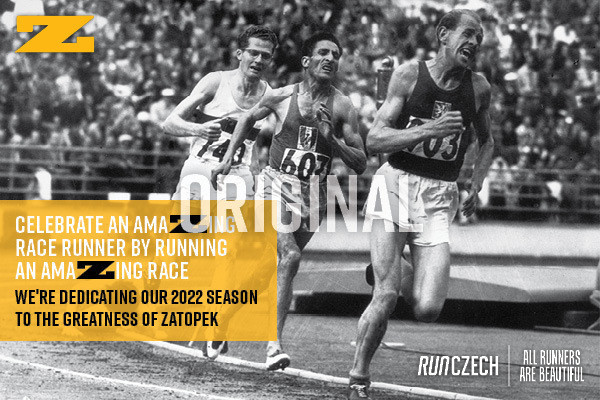
At that World Marathon Cup in Athens more than a quarter-of-a-century agone, the status that Zatopek was held in by everybody was clear.
Between them, Sohn Kee-Chung, Waldemar Cierpinski, Carlos Lopes, Gelindo Bordin, Hwang Young-cho, Rosa Mota and Valentina Yegorova could have claimed to take won viii Olympic marathon gold medals. But, on this day at a hotel eatery in Athens, they had formed an orderly queue at the table of Zatopek to offer him their carte cards to sign. They shuffled forward patiently, clearly excited at coming together such a famous celebrity.
Kee-Chung, revered as a hero in his own country for the way he defied the Japanese occupiers by insisting that he was a Korean and nothing else after his Olympic victory in Berlin in 1936, bowed as he approached the table as if greeting royalty. Bordin, the Italian who won in Seoul in 1988 and spurred a national jogging boom, said: "Many say that I am a bully runner because I won a gilded medal. So, what does this make this man?"
To me, Zatopek remains the greatest distance runner of all time. He prepare 18 world records and had a six-year run of 38 victories in the 10,000m. Also equally his three Olympic gold medals at Helsinki 1952, he also won the x,000m at London 1948 and a silvery in the 5,000m.
Yet merely to list Zatopek's able-bodied accomplishments misses the man. On that warm leap evening in the Greek capital, the cradle of the Olympic Movement, he fairly burst with enthusiasm for life, greeting strangers with openness, sitting around a table conversing in a multifariousness of languages or spontaneously breaking into song. Zatopek'due south honesty, charm and humility, plus his courage in the face of Soviet repression, had fabricated him a genuine hero.
On this special occasion, Zatopek did not encounter himself as a fable but equally an athlete meeting kindred spirits. He was clearly thrilled to see people he had watched only on the television at his minor bungalow in Prague. "So, you are the great Lopes," he said as the 1984 Olympic champion from Portugal introduced himself. "I must have your autograph. Await till I tell Dana I have met yous. She will exist very jealous. She is a big fan."
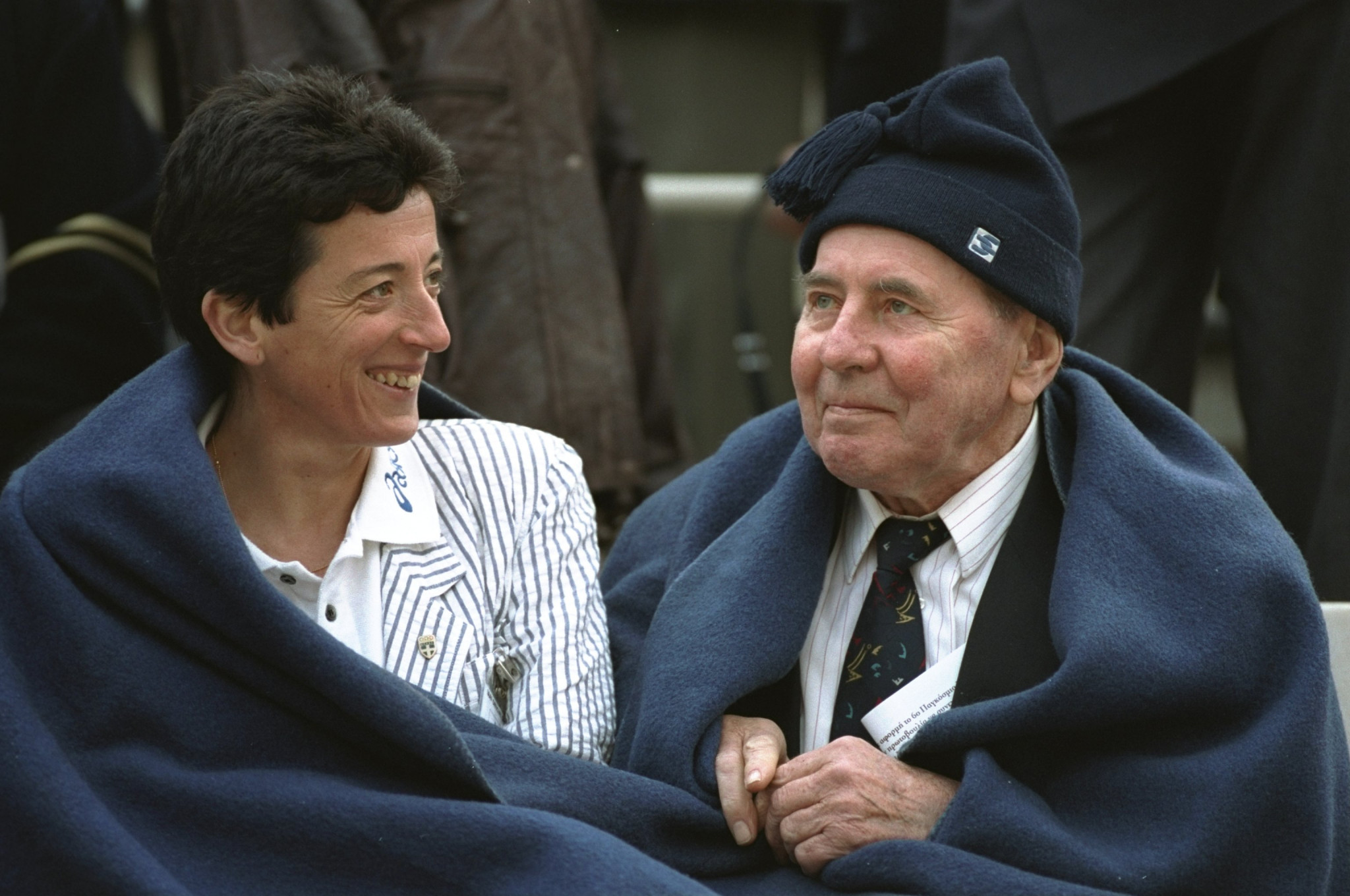
Office of the Zatopek fable stemmed from his unforgettable running style. Information technology was once described equally "the well-nigh frightful horror spectacle since Frankenstein." Where other runners were graceful, like human being gazelles, the Czech runner "seemed on the verge of strangulation; his hatchet face was crimson; his tongue lolled out."
Difficult work was his ally. He ran miles and miles and more than miles, frequently more than than 100 a week. He trained in hard combat boots to make his anxiety feel lighter on race twenty-four hours. He ran the stairs of stadiums for endurance. He ran in place in his bath.
"I started belatedly," he said. "I was most xix. I never had participated in whatever organised sports. I was working in a shoe factory in Zlin, where I was born. The director of the manufacturing plant said one day that there would be a race through the metropolis on Sun, and that I should run. I did not want to go. I told him I had a common cold. I told him I had a bad knee. He made me go to the company doc. The doctor said I was fine. I had to run. I surprised myself. I finished 2nd."
The sport was his release. He ran through World War Two. The Nazis had taken over his country so chop-chop in 1939 that information technology hardly had a adventure to whimper. He ran through the Nazi era. The austerity of his state of affairs somehow helped him go a better runner.
"If there is luxury, at that place is the danger of degeneration," he said. "Sit down behind the cycle of a car and a man gains time but loses condition. There was no auto. I ran instead. Look at the distance champions today. They are generally Africans. Runners from underdeveloped countries. They are not softened by luxury."
When the War concluded, he was drafted into the new Czech regular army and at first thought it was a terrible fate. Terrible? The army wanted him to run. He ran in the all-time facilities with the best trainers. He was shortly breaking national records.
As the 1948 Olympics in London approached, he was Czechoslovakia'south best hope. A few weeks before the Games he attended a meeting at which his chances of breaking the national record for 3,000m became the focus of attention.
"I was warming upwards when there was a dandy roar and the announcement that a record had been set. I said, 'What is this? A tape? How can it be? I have not run withal.' I was told it was a record in the women's javelin. I was asked to congratulate the woman. I did. We had our pictures taken together. Then I gear up my record, and she congratulated me."
Information technology was Dana. He was strumming songs for her on the guitar by the time they went to London. He won the 10,000m, the offset runner to win an Olympic gold for Czechoslovakia. He finished second in the five,000m. She finished seventh in the javelin. They married two months later. Their apartment in Prague became office dwelling, role gymnasium. Each had a carve up training schedule, merely at dark they would throw a medicine ball to each other. Sometimes the brawl landed on the floor, and the neighbours downstairs would complain. They would get for picnics in the woods on weekends. She would fix the lunch. He would programme the direction of the training run.
"Dana used to complain that we never had normal picnics," Emil laughed. "So, I promised her we could then I would go off on a 25km run."
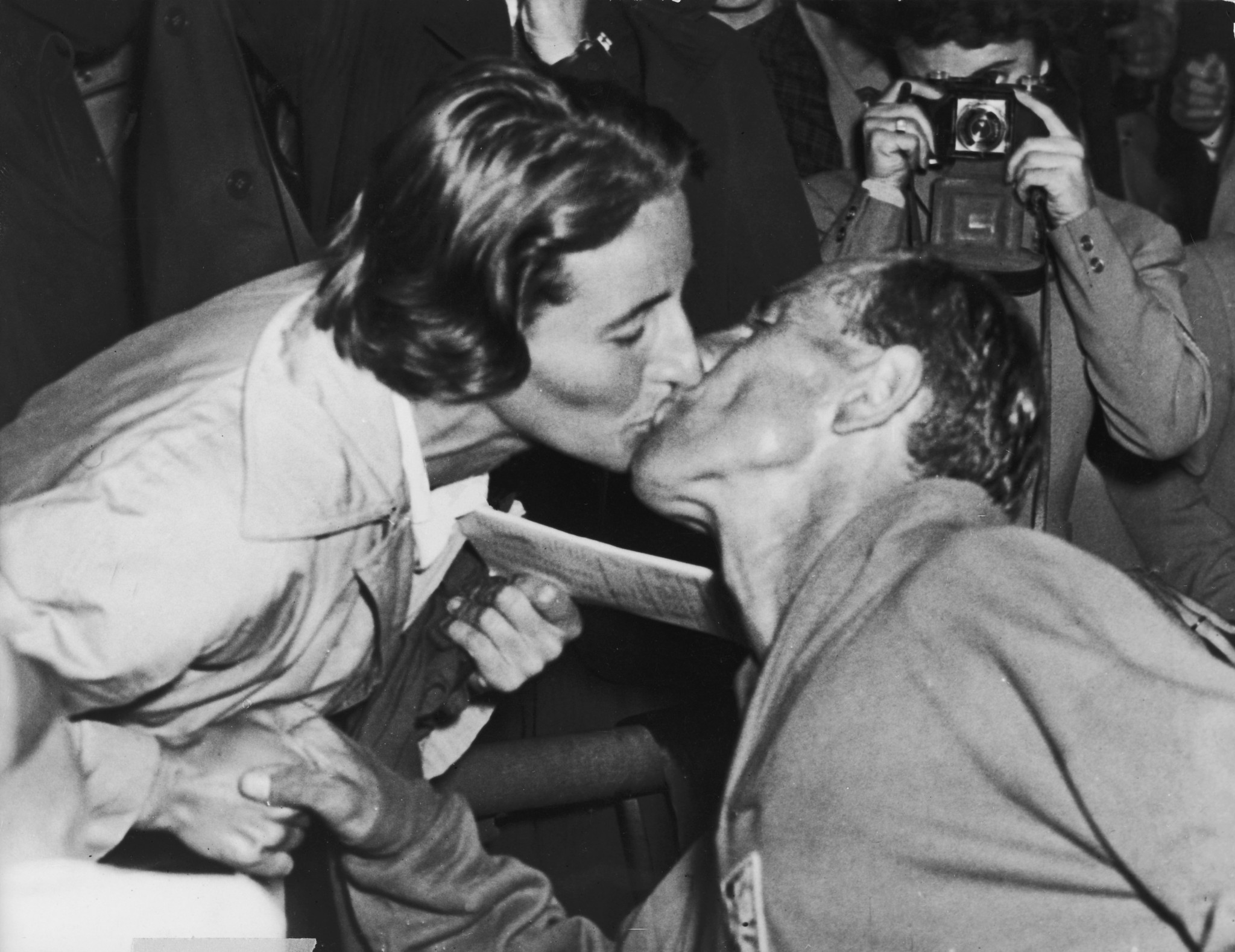
At the Helsinki Olympics, the local story became the Worlds. Emil noticed that the schedule offered the possibility of running the 10,000m, the 5,000m and the marathon. In that location were two days of residual between the first two events, then 3 before the marathon. He would endeavour all three. Dana noticed something else: the 5,000m final would be run at the aforementioned fourth dimension as the women's javelin last.
Just she nonetheless had not performed when the 5,000m was run. She was waiting in the tunnel leading into the stadium. All she could hear was noise followed by silence. Who had won? Information technology was Emil. By the time the medal was awarded, and the Czech anthem was played, she had come into the stadium. She was able to yell to her husband as he took a victory lap.
"Emil," Dana said. "Give me the medal. I will put it in my bag for luck."
She carried the bag, as well as her emotions, to the competition. On the showtime of her throws, she propelled the javelin far enough to win the gold medal in a stunning upset. Emil had already won the x,000m and he finished the Olympics by winning the marathon. It was the showtime marathon he ever had run. He had never raced so far before and chose to follow the favourite, Jim Peters of Britain. He had never met Peters but knew his race number and said to him at the commencement: "Hello, I am Zatopek."
Peters led for 15 kilometres when Zatopek pulled up to him and wondered aloud: "The pace is it too fast?" Peters responded: "It is too slow." Later that, Zatopek took the lead. He won past two-and-a-half minutes. Emil and Dana returned home equally heroes.
The side by side 24-hour interval afterwards our interview in Athens I saw Zatopek at the airport and approached him to say goodbye. He kissed me on both cheeks and thanked me for remembering him. I told him that equally long as people ran, he would exist remembered.
"Do y'all really recollect so?" he said.
Emil Zatopek: a truthful champion, on and off the track. A nifty man and a humble person.
Source: https://www.insidethegames.biz/articles/1120647/duncan-mackay-blog-on-emil-zatopek
Post a Comment for "After Paying 50"